Yves here. This post is written in anodyne technocratic terms, but the data is sobering. A key point is the influx of migrants, particularly from Syria, which has a well-educated population, is going to make an already-dire situation worse. Denying young people any hope of a decent future is certain to lead to radicalization. Yet European leaders act as the Market Gods must be appeased, no matter what the human cost.
By Nuria Boot, Research Assistant in the area of Competition Policy; Karen E. Wilson, who has worked in the Structural Policy Division of the Science, Technology and Industry Directorate at the OECD and is an Associate Fellow at the Said Business School at Oxford University and a Visiting Lecturer at the Stockholm School of Economics in Riga; and Guntram B. Wolff, Director of Bruegel and a member of the French prime minister’s Conseil d’Analyse Economique. Originally published at Bruegel
Youth unemployment in the Mediterranean region has consequences for the whole of Europe. Tackling youth unemployment in the region must continue to be a high policy priority.
Europe’s Mediterranean neighbourhood has become a focal point of attention due to the refugee crisis. With over a million people arriving in Europe in the course of 2015, the question of how to address the growing immigration pressures has become a central political issue.
Countries around the Mediterranean are also under scrutiny due to mounting security concerns in Syria, Libya and elsewhere. A range of economic literature links conflicts to demographic conditions and poor economic opportunities for young people. Countries undergoing “demographic transition”, resulting in very youthful populations, are especially vulnerable to conflict, in particular when economic opportunities are scarce (Homer-Dixon 1999; Kelley & Schmidt 2001; Urdal 2004; Kahl 2006).
Youth unemployment is an urgent issue in many countries across the Mediterranean region, where 25.4 million people are unemployed, of whom 7-8 million are aged 15-24. (World Bank 2014; United Nations World Population Prospects 2015). 490 million people live in the region, of which 192 million are part of the 8 EU member states.
The proportion of young people not in education, employment or training has increased since the financial crisis, and in many countries youth unemployment rates are higher than unemployment in the older working age population. The figures available may even underrepresent the true level of unemployment due to non-participation in the labour market.
The growth in youth unemployment is particularly worrying. It can have long-lasting effects on productivity and potential growth, often excluding young people from the labour market for an extended period of time, lowering their productivity and affecting their job prospects for life (Arulampalam 2001; Gregg and Tominey 2005).
The demographic structures of Mediterranean countries vary widely, as can be seen in Figure 1. Median ages in non-EU Mediterranean countries are generally lower than in EU Mediterranean countries. The two most populous non-EU Mediterranean countries, Turkey and Egypt, both have median ages well below any EU country.
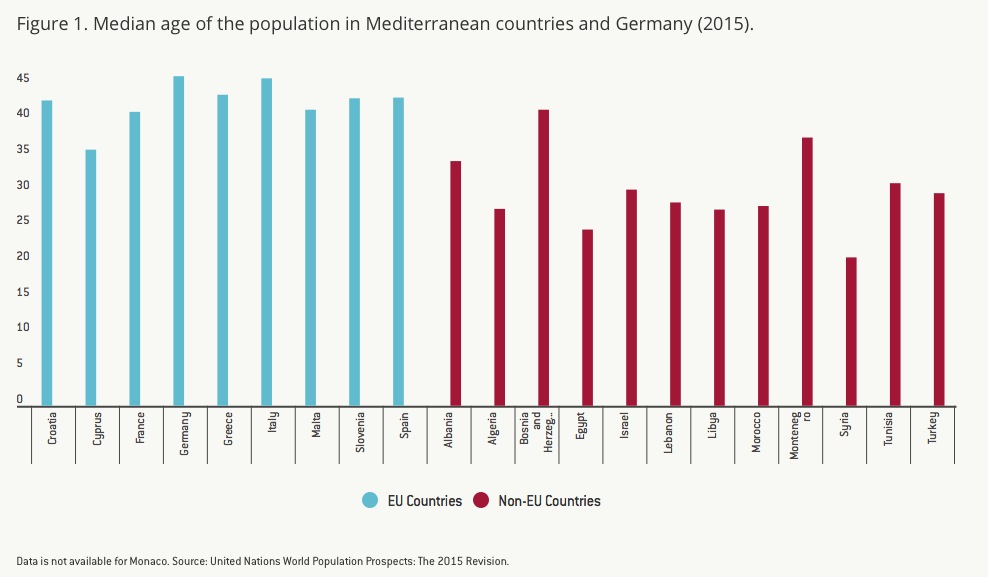
Around the Mediterranean, the median age has increased substantially over the past two decades, but with significant differences across countries.
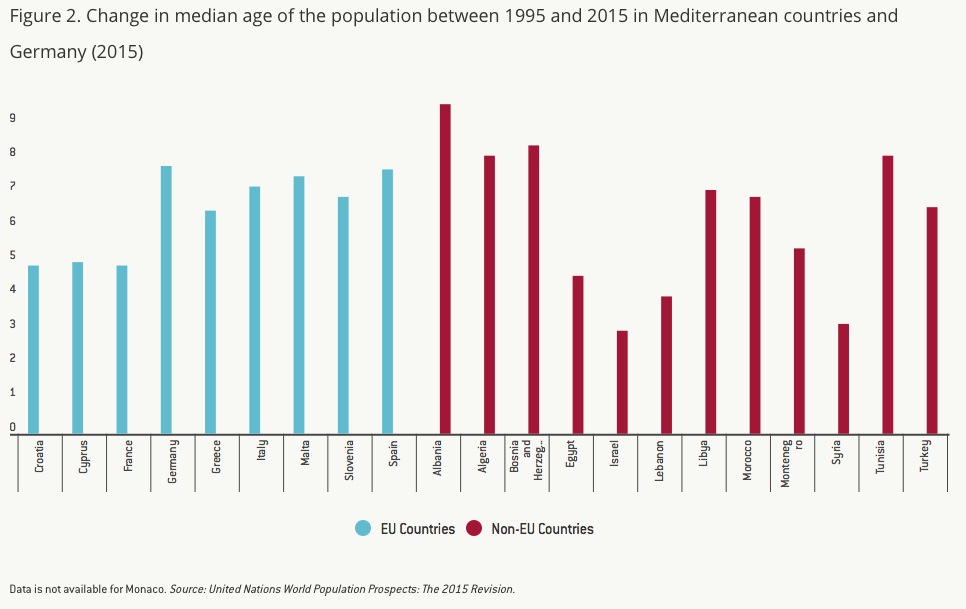
Over the past decade, growth per capita was higher for the non-EU Mediterranean countries. Figure 3 shows the average annual GDP per capita growth of the last ten years, based on purchasing power parities.
The low growth figures in the EU reflect the deep scars left by the euro-area crisis. Growth in non-EU countries was relatively robust in comparison, suggesting some income convergence, although from a low per-capita level.
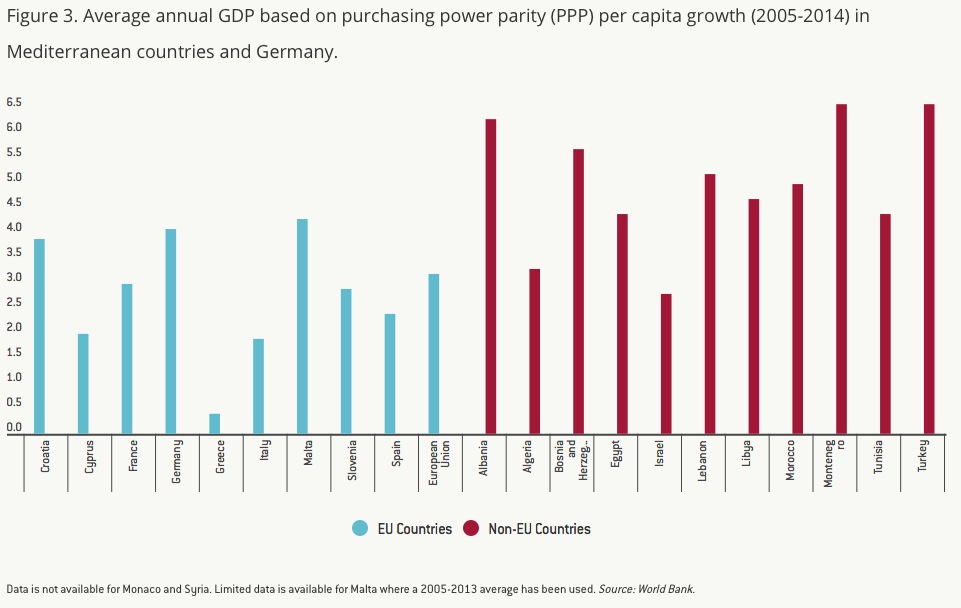
Unemployment rates in the Mediterranean rose more sharply for EU member states than for non-EU Mediterranean countries over the past 10 years, again reflecting the economic crisis. Unemployment rates at least doubled between 2005 and 2014 for Cyprus, Greece and Spain, with the highest increase in Cyprus where the unemployment rate nearly tripled from 2005 to 2014. Unemployment rates also increased for four non-EU Mediterranean countries (Albania, Bosnia and Herzegovina, Egypt and Syria).
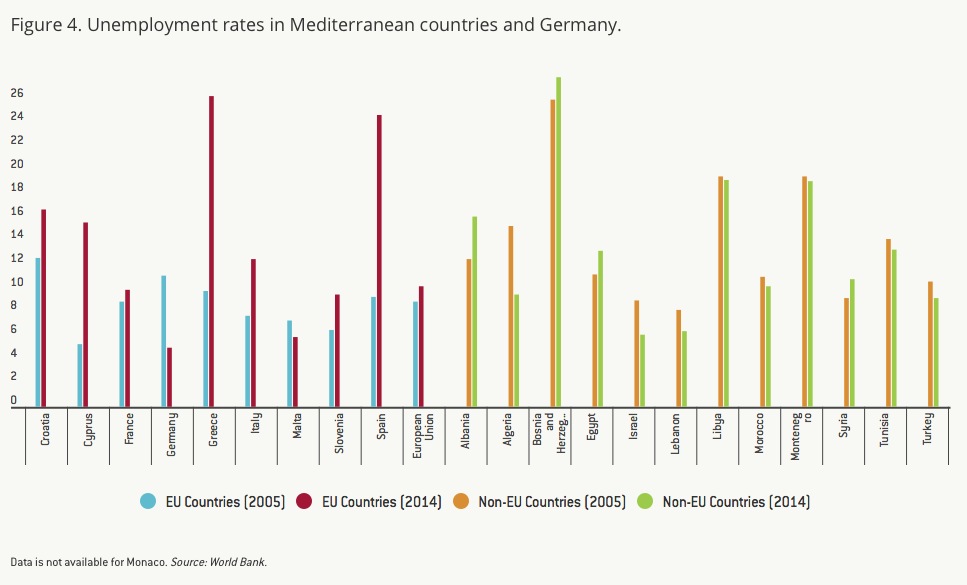
Youth unemployment rates, defined as the share of the labour force aged 15-24 without work but available for and seeking employment, increased much more than overall unemployment rates in most Mediterranean countries from 2005-2014.
Youth unemployment rates in Croatia, Cyprus, Greece, Italy, Slovenia and Spain rose more sharply than the EU average. Youth unemployment rates in the non-EU Mediterranean countries have also increased over the past ten years, including in those with already high youth unemployment rates such as Bosnia and Herzegovina, Egypt, Libya, Montenegro, Syria and Tunisia.
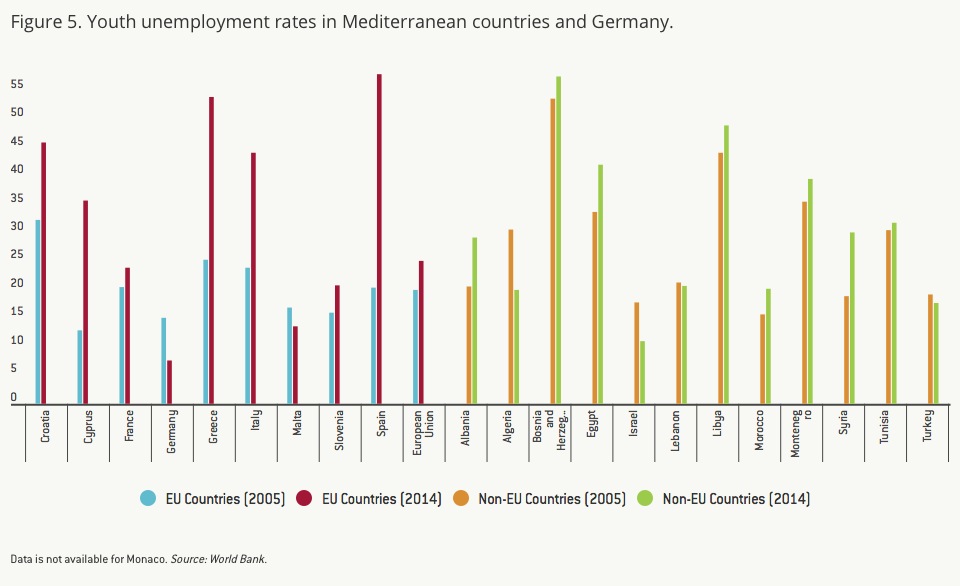
Labour force participation rates have remained similar to levels ten years ago although participation dropped in some EU countries including Croatia, France and Slovenia as well as in the non-EU countries Albania, Morocco, Montenegro and Syria. Israel’s labour force participation rate changed most, with an increase of almost 8 percentage points compared to a decade ago.
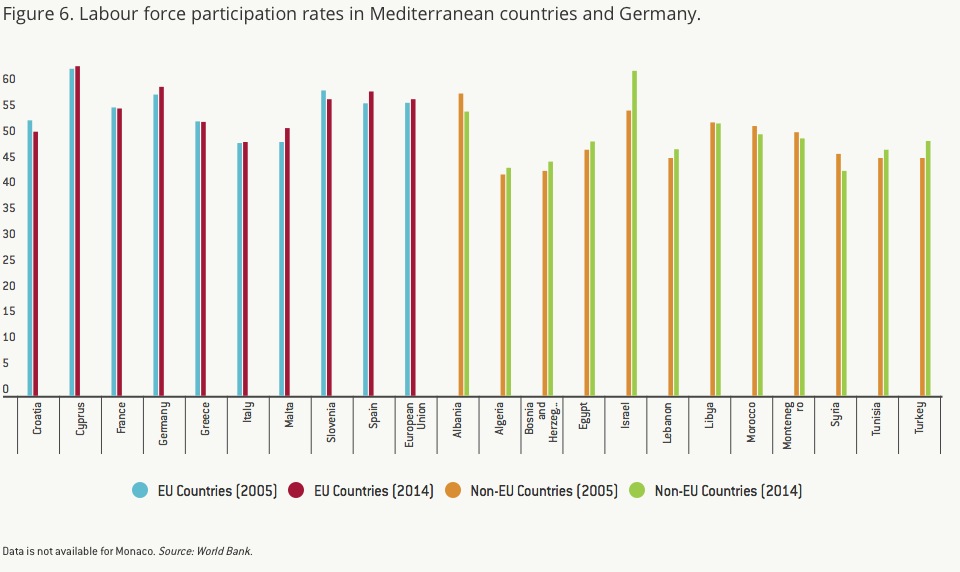
In a number of the Mediterranean countries, female unemployment is much higher than male unemployment, but this is likely distorted by the significant differences in participation rates of men and women. In the non-EU Mediterranean countries, female unemployment rates in Algeria, Egypt, Lebanon, Libya and Syria are at least 1.5 times as high as male unemployment rates, and, with the exception of Egypt, the difference has increased in the past ten years.
For most EU Mediterranean countries, male and female unemployment rates were similar in 2014, with lower female unemployment rates compared to male unemployment rates in Croatia, Cyprus, France and Germany. Notably, gaps between female and male unemployment rates – which used to be substantial – lessened in Greece, Italy and Spain between 2005 and 2014.
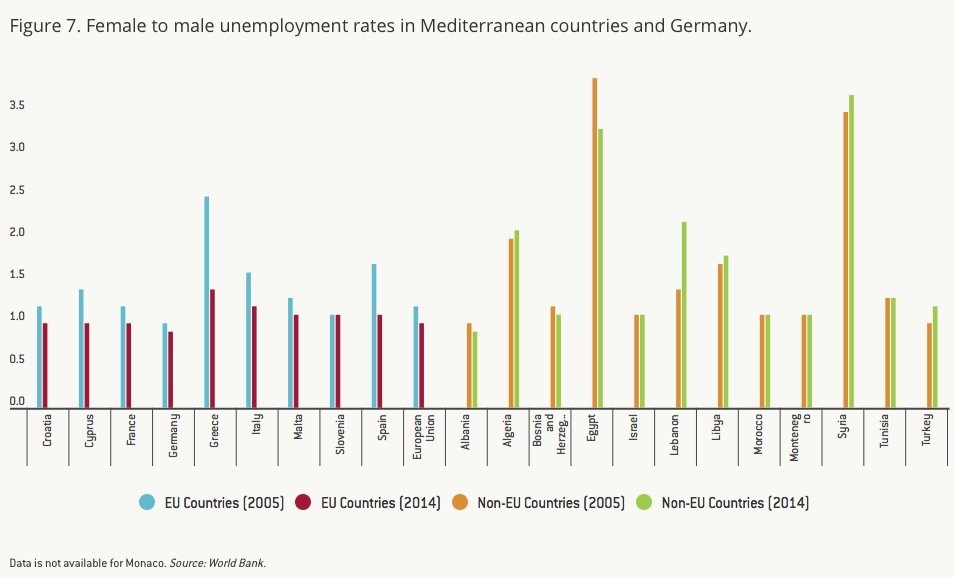
The Mediterranean faces a crisis of unemployment and youth unemployment that matters not only for the countries individually but also has wider implications, including for the EU as a whole. Initiatives in the region have failed to prevent high levels of youth unemployment (European Commission; European Training Foundation 2015; Koenig 2016).
Meanwhile, demographic pressures and immigration flows suggest that unemployment rates could increase further in the years to come. Tackling youth unemployment in the region should continue to be a high policy priority, but the focus must be on programmes that have demonstrated results. In addition, the EU’s neighbourhood policy needs to be given greater priority and should include some countries, such as Libya and Syria, which are currently at the margins of the partnership.


The unemployment/immigrant combo is a win-win for Brussels. It allows them to stick to their Thatcherism and divert the inevitable anger against them onto immigrant scapegoats.
An objective look at Europe– its population density, its resources, and its aging population shown above– clearly demonstrates that it could easily absorb over 1 million immigrants per year (fleeing US/European wars). But to do this it would need to have a rational economic policy that creates jobs instead of obliterating them. Thus not having a rational policy serves a dual purpose: making the Euro oligarchs rich at workers’ expense, and then inciting said workers against immigrants: a self-licking Eistüte
Whenever we refer to this issue as an “immigrant problem” instead of what it actually is, a fiscal policy problem, we are just feeding the beast.
It was pretty obvious to me, even back in the earliest days of the Greek crisis, that the oligarchs in Brussels would never budge, and would instead grab every penny for themselves and their balance sheets at the money center banks. I will go this way like it has so many times before, and will end the same. Historians will record it as the inability of diverse populations to get along, but the reason for the coming war will be the same as for all the previous European wars. There won’t be enough left to feed the people after the bankers get their hind trotters out of the trough..
You talk of immigration as if were simply a matter of economics. But economics is the least of it. Continuation of the current migration will lead to massive bloodshed. The internal state of places like
Syria, Iraq and Libya is the long term future of Europe if massive immigration continues.
the politically incorrect elephant in the room: family planning.
Med. region (Islam), Sub-Sahara Africa (Islam + Catholicism + bits of evangelicals and Mormonism)
All the major newly industrialized countries, China, Japan, Korea, Taiwan had some form of government-sponsored family planning.
Obviously not praising the China way. But c’mon—there’s a reasonable middle ground between China and fundamental monotheism.
And we must not forget to thank St. Ronnie Reagan, “the first president who actively opposed family planning” and cut funds across the board, especially for overseas initiatives. Otherwise, how would multinationals have a bottomless pool of people willing to work for $1 an hour?
Actually, the birth rate in the catholic countries of the mediterranean is extremely low. Its falling below replacement rates in parts of Italy and Spain in particular. The birthrates in north Africa are high, but at a level you’d expect for such poor countries. Religion has almost nothing to do with birth rates, countries tend to share birthrates according to the socio-economic factors and the level of support for working mothers (in the case of developed countries). Policies to increase or decrease population almost always end up having only a short term impact, even with China’s one child policy, the overall demographic trajectory of family size has followed Asian and worldwide norms.
Ah yes, the answer to the “brown people problem” is for there to be less brown people.
FAIL.
thank you for proving my point—subsection (b) to Godwin’s Law, if someone isn’t called Hitler, someone will be called racist.
No, sorry invoking some mutilation of Godwin will not excuse your horrid comment. The topic is youth unemployment in the Mediterranean. There are clear ways to reverse the problem and have jobs for whoever wants one (e.g. The Marshall Plan suggested in another comment). But you decided the real problem is not intransigent oligarchs but rather too many third worlders– thus letting bad policy makers off the hook and blaming the victims instead.
Hey I have an idea, let’s have a Marshall Plan for the MidEast.
We take all of the funds we spend bombing, invading, and surveilling these countries and put it in a development fund. We use the fund for hospitals, bridges, factories, highways, clean water, and social development.
We get peace and stability and great new markets full of millions of people who like us again. Shrink the Pentagon down so it’s small enough to strangle in the bathtub.
(Come to think of it, that has been the Chinese plan all along. Oh well can’;t do what they’re doing, we’ve got people to drone! And besides that electromagnetic space rail gun is almost ready, gotta have SOMEONE to use it on…)
‘We get peace and stability and great new markets’
Not going to happen. At present warming rates, by 2100 the ME — without some plausible method of geoengineering to cool the region — is set to be in substantial measure uninhabitable.
how about a state-managed development economy, as in lack thereof, problem? These countries need protected economic sectors and plan-based investment, not free trade and hot money.
When Mubarak was running Egypt, he and Suzanne had a long term family planning program aka birth control and it was successful; with the Muslim Brotherhood and now El Sissi, the birthrate has doubled. The implications for a country that ran out of water to feed its population in about 1970, and is now also facing the Ethiopian dam, are dire. And, of course, the US has “sold” Egypt massive weapons in the form of US AID…aka subsidies to the US military industrial complex. So, no food, reliant on imports and now heavily armed. Nice.
Birth control does work. It is intelligent to have it. Writing about massive youth unemployment without writing about birth control is blind and pointless. And the world is going to suffer hideously for not paying attention to it everywhere. The four horsemen take down the numbers every time. This time, climate change will move any that survive back to the stone age.